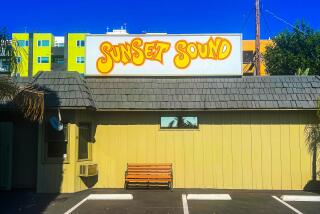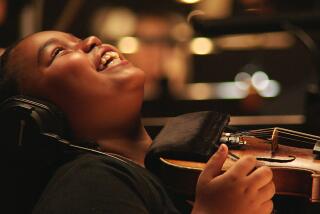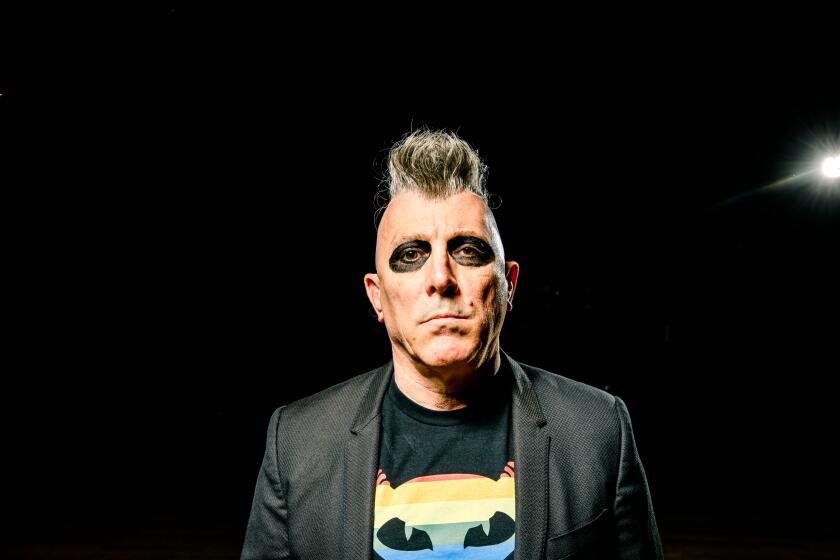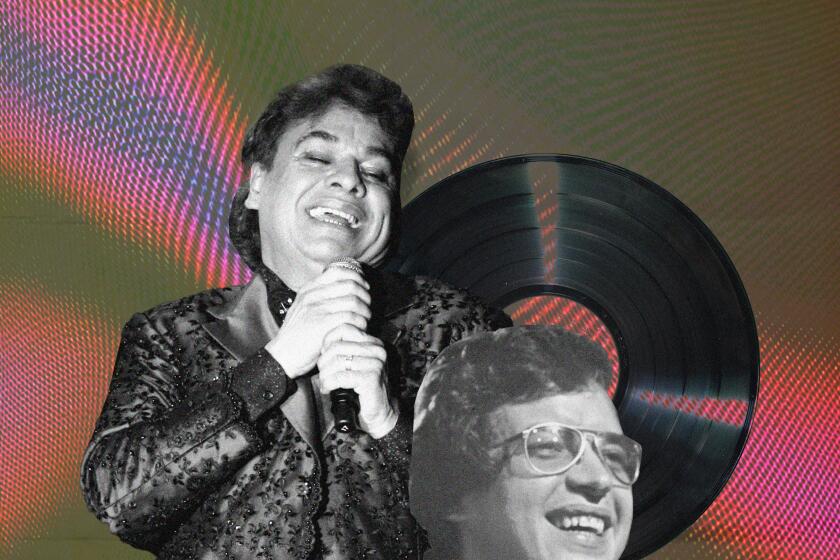Ben Harper and his mom roam the store that was a childhood home
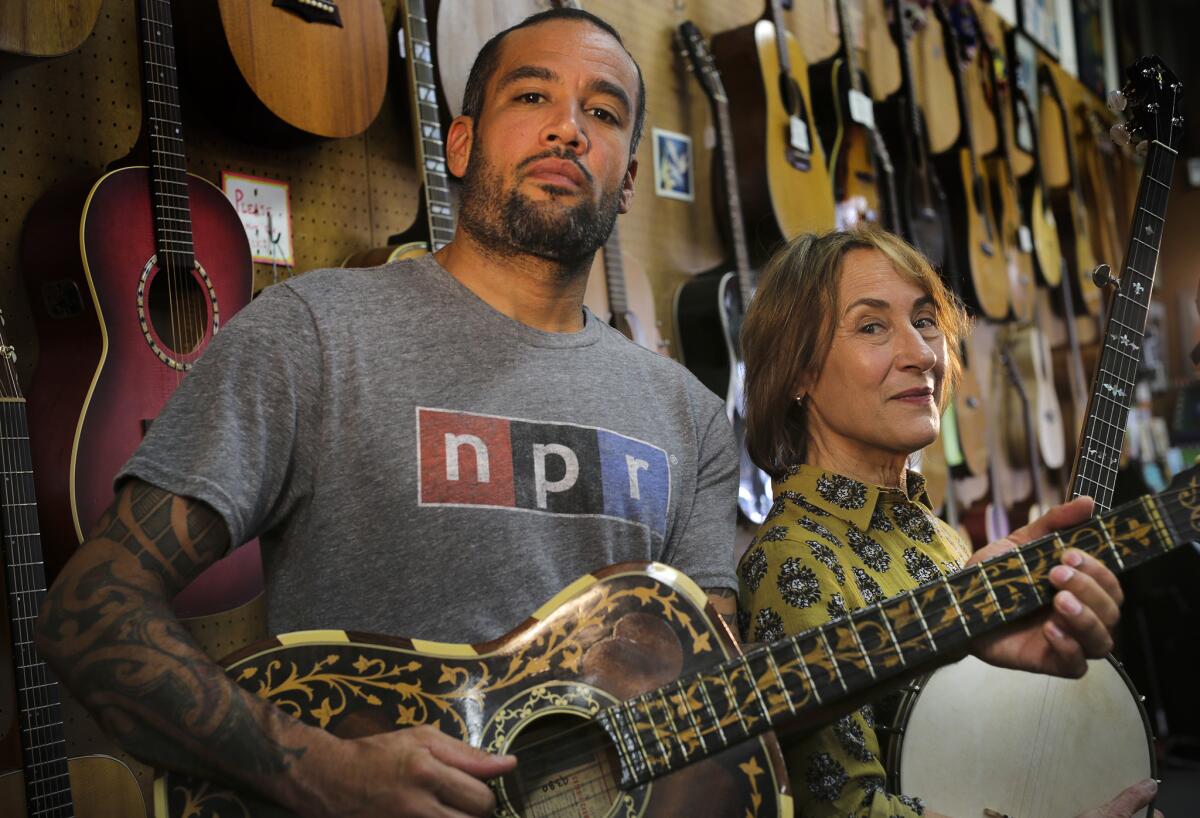
Ben Harper took the old guitar down from the wall and held it in his hands. It had been at the Folk Music Center in Claremont for decades, during many of the years that the singer-songwriter had grown up at the store, learning to play and repair acoustic instruments. But only now had he even noticed the thing, with its dark wood and flowery designs painted onto the surface.
It arrived from Madrid a half-century before, just one of countless acoustic guitars, African drums, flutes, banjos, sitars and other instruments collected, bought and sold at the store since his grandparents founded it in 1958.
“Isn’t that cool? It’s hard to part with some of these,” said his mother, Ellen Harper. She grew up at the store too, working the aisles and cash register after school, and by age 16 she’d begun performing her own folk songs at local clubs. “My favorite music in all the world is just a guitar and a voice. It’s the most moving.”
Family history runs deep at the Folk Music Center, the launch pad for Ben Harper’s career as a Grammy-winning rock, folk and blues artist. It’s also the foundation beneath Harper and his mother’s first album together, “Childhood Home,” a warm, understated collection of 10 songs of commitment, community and protest.
“It could never be a normal upbringing in a place like this,” said Harper, 44, who lives in Los Angeles. “It’s an oddity that has produced the last 20-some years of my adult life making music. Not only musically but the principles of this place — its music, its art, its poetry, its politics, its spirituality.”
It was another busy weekday afternoon at the store, with customers trying out instruments and little kids playing on the carpet. Harper’s brothers, Joel and Peter, stood among the dulcimers and ukuleles, the train whistles and silvery dobros. Youngest sibling Peter Harper’s just-released debut CD was displayed on the counter.
The store is a cultural center in town, much like McCabe’s Guitar Shop in Santa Monica, homegrown rarities in an era increasingly dominated by national music store chains. It is host to the annual Claremont Folk Festival, where Harper and his mother recently celebrated the release of “Childhood Home” with a lineup that included Los Lobos’ David Hidalgo and Louis Perez, Dave Alvin and the Chapin Sisters.
Among the songs was Ellen Harper’s “City of Dreams,” with lyrics inspired by Claremont and what she describes as overdevelopment in the small town that “has taken over what makes life good.” She mourns the groves and native oak and canyons that were swept away for the 210 Freeway, though the song is “about anywhere, really, that’s lost its identity.”
The store was founded by Ben Harper’s maternal grandparents, Charles and Dorothy Chase, whose mission was to bring folk music to the community, with political leanings in the tradition of the Weavers and Woody Guthrie. Among their friends was Alan Lomax, who famously gathered midcentury field recordings of essential American folk and blues musicians.
In later years, Charles Chase was a grandfatherly but forceful presence in a white beard, which Ellen explained was initially to protect his face from the irritation of the wood dust and chemical compounds from repairing instruments.
“He told me a different story. He told me he was bucking the man,” Ben said.
“Oh, well, you know that came later. I think that’s when he decided to have an unruly beard,” his mother replied, and both laughed.
‘Glad you didn’t wait’
Harper and his mother sat in a small practice room, its shelves crowded with violin cases, some covered in dust. Across the hall, a guitar lesson was being given to a young player. In the main room, someone banged hard on the drums.
Before his death in 2004, Chase sold the store to Harper, who by then had the resources to ensure that the business continued for another generation. “I could think of nothing more worthy of working hard for — keeping this going,” Harper said.
He has been releasing about an album a year of late, the last one, “Get Up!,” a fiery blues recording with harmonica master Charlie Musselwhite. In January, it won the Grammy for best blues album. His follow-up was “Childhood Home,” a project he had talked about for 17 years.
“I’m glad you didn’t wait until I was 90,” said Ellen, 67, turning to her son.
He nodded with a smile and noted her patience while waiting for it to happen. “I’m glad we got to it before we got to the ‘clean-your-room’ spectrum.”
The album was recorded over 12 days at Harper’s studio in Santa Monica, beginning with the songs “Born to Love You” and “City of Dreams,” acoustic duets of deep feeling and conviction. As basic tracks were completed, Harper’s ideas of adding layers of steel guitar and other sounds faded away.
“As sparse as it was, at a certain point it couldn’t be touched. I had to leave it alone,” he said, adding that the songs were chosen with care. “It’s not easy for a mother and son to sing a duet. You can’t just sing about anything.”
The Harpers each brought original songs to the album, with music that is gentle and disarming. “Born to Love You” is a duet in the aching, vulnerable tradition of Gram Parsons and Emmylou Harris, set to light acoustic guitar and a barroom piano melody. “Heavyhearted World” steps into darker territory as their voices sadly harmonize: “It’s Christmas morning in the psych ward / There’s a flight risk today so a nurse guards the door.”
A family schoolroom
Ellen Chase began performing music in the mid-’60s, venturing to such nearby clubs as the Cat’s Pajamas and the Golden Ring. When she began studying at Cal State Long Beach, she turned up at clubs there. She played in a band and witnessed that decade’s rock and folk tumult up close and met Jimi Hendrix and others on the Sunset Strip. “Those guys were pretty shocked to see a female pick up a guitar and play,” she recalled. “That was the feeling at the time.”
A single mother with three sons, she never seriously considered a full-time career making records and performing. She worked at the store and played with a band on Friday and Saturday nights, making a little extra money. “I had kids, so I couldn’t go too far and wide,” she said. “I was tempted, but I wanted to keep life stable for them.”
Their musical education began early. Ben’s father, the late Leonard Harper, once took him as a child to see Bob Marley and Peter Tosh at the Starlight Bowl in Burbank, and his mother brought him to see Jimmy Cliff and Jackson Browne in Hollywood. There was once an intimate concert by Country Joe and the Fish in his grandmother’s living room, “where two hours before I had been playing with blocks,” Harper recalled.
His parents divorced when he was 5. He was the son of an African American father and a Jewish mother and spent his days amid the vast mingling of cultures at the Folk Music Center. In high school, he was interested almost exclusively in hip-hop, but by his late teens he returned to the guitar. He dug into bottleneck blues first, then found his musical voice with the Weissenborn lap slide guitar, encouraged by his grandfather.
“Because of my upbringing here, that was always my go-to voice,” he said. “It was just too deeply rooted to move away from. Not that I couldn’t produce for hip-hop, but it wasn’t my voice. I love instruments and songwriting too much.”
Working at the store gave him a physical intimacy with instruments that many of his fellow musicians don’t quite share. It sometimes meant his band would turn to him for technical help on the road, leaving guitar and bass strings under his hotel room door.
“I’m still such a geek about it,” he said with a laugh. “Come sound check, I spend as much time talking about my instruments as I do playing. It’s a part of staying connected to the instruments themselves and the fabric and fiber of what makes them.”
His mother was prepared by her years at the store for the new attention her music is attracting. Harper remembered bringing his mother and aunt onstage at Madison Square Garden to join him during a 90th birthday tribute to Pete Seeger in 2009. Harper said he still gets stage fright before a gig, but his mother and aunt seemed unfazed by the event.
“We stepped up to play, no sound check, with my mom and her sister,” Harper recalled. “No one steps up in front of 20,000 people at Madison Square Garden without the jitters. Your hands weren’t shaking, your voice wasn’t shaking. It was incredible.”
Married and divorced twice, Harper has four kids who’ve spent quality time at the store. “So far they’re all crazy musical in their own way. They’ve got great ears, great harmonies,” he said. His eldest, teenage Charles, “is into dubstep and electronic music,” Harper said. “That’s his thing. And I couldn’t be happier. For me it was Beastie Boys or bust.”
Harper said he has spent more time at the store in the last two years than he has in the previous 20, as he takes more time off the road. He hopes to add a professional recording studio for himself and for local talent.
His career keeps him busy enough as he contemplates his next album: maybe reuniting with his original band, the Innocent Criminals, or his trio Fistful of Mercy, or doing another blues record with Musselwhite. Harper isn’t exactly back to repairing instruments.
“Not yet,” he said with a grin, “but I’ve threatened.”
More to Read
The biggest entertainment stories
Get our big stories about Hollywood, film, television, music, arts, culture and more right in your inbox as soon as they publish.
You may occasionally receive promotional content from the Los Angeles Times.

